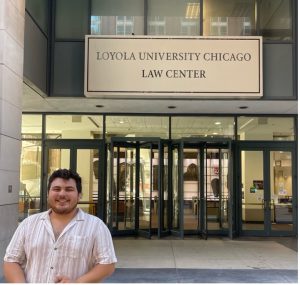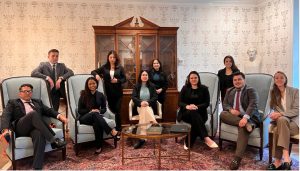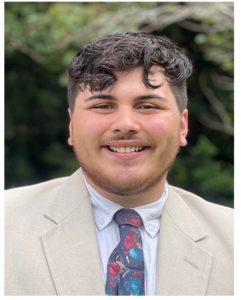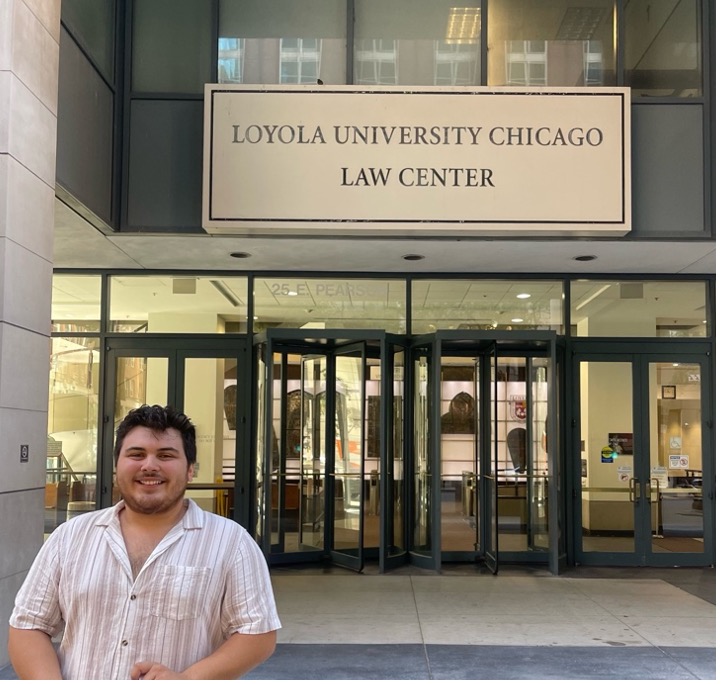The Rejection
Waitlisted. Well, technically not waitlisted. The email for the specialized intellectual property (“IP”) Legal Writing course called me “an alternate.” In my head, that was the same as being rejected. Alas, I gave up on my career aspirations in IP before the first day of law school. I’m kidding. In part. The rejection did happen. But, that rejection was actually the beginning of my true IP journey, not the end.
Why IP @ Loyola
I came to law school certain that I wanted to practice IP law. As a former high school science teacher, I challenged myself to continue to leverage my science competencies. I knew I could do just that with patent law. Patent law is a subset of IP law dealing with protecting inventors’ rights to their new, useful, and nonobvious inventions.
However, I had been certain before. Like in my undergraduate journey. I began as an International Studies major and ended with a degree in Environmental Science and Communication. This taught me the value of flexibility. So, while I was confident about IP law, I knew my interests could change. This appreciation for exploration is what really drew me to Loyola University Chicago School of Law (“Loyola”) and the Intellectual Property Law Program.
Loyola students have access to course, career preparation, and networking opportunities pertinent to IP from early on — as early as Day 1. Among these early opportunities include the IP Legal Writing course, available to 1L students. As a prospective student, I liked that I could pursue my interests early on without being locked into a certificate program if my passion for the subject waned. This was a big factor in my prompt acceptance of Loyola’s admission offer.

Acceptance of an Alternate Route and Finding Community Along the Way
Alas, when the application for the IP Legal Writing course opened during the summer months, I of course applied. Yet, I remind you: I was rejected.
I initially perceived this rejection as being the end of my IP journey. As a current contributor to IP Bytes, I can fortunately say that it wasn’t. My IP journey did NOT end with that rejection. After talking with my partner, I decided to reach out to the IP Program Director, Professor Cynthia Ho. Instead of wallowing at the setback, I asked her for advice on how I could further explore my IP interest. She assured me that plenty of students had successfully obtained IP jobs without ever taking the specialized Legal Writing course. We then discussed other means of exploring my IP interests as a 1L. This included enrollment in an IP-focused elective available in the Spring semester, involvement with Intellectual Property Law Society, and applying to contribute to the IP Bytes blog.
I subsequently acted on this advice. I met fellow students who shared an interest in IP law. Together, we participated in programming such as virtual office hours with firms such as Steptoe, LLP. We also benefitted from a speed mentoring and networking event cohosted by the Intellectual Property Law Association of Chicago. Among many more opportunities! I continued to see these students in the Spring semester, during Professor Ho’s “Global Access to Medicine: A Patent Perspective” course, where we learned more about patent law and policy, including how seemingly neutral laws can result in inequitable access to treatments. In taking Professor Ho’s advice, I found a community of fellow students. While first joined by a shared interest, I now consider them close friends.
Another Application: From the Classroom to D.C.
One friendship developed was with then Managing Editor of IP Bytes, Iris Gomez. As a fellow Latine student interested in IP law, she approached me after class one day. She shared with me her experience having attended the Hispanic National Bar Association’s Intellectual Property Law Institute (“IPLI”) in Washington, D.C. the previous summer. Iris encouraged me to apply. Seeking to further my exposure with the topic, I did just that.
Months later, an acceptance came. Thankfully. Truly. My experience at IPLI in summer 2025 provided new opportunities for me that I will forever cherish.
Throughout the week-long program, I participated in educational and networking experiences. I engaged directly with leading practitioners. Judges. Regulators. Legislators. All from various institutions. From the Supreme Court of the United States and the U.S Court of Appeals for the Federal Circuit to the International Trade Commission and other agencies! The educational sessions explored everything from AI’s impact on copyright to video game licensing. I left D.C. with a bigger-picture view of the IP field and a network that stretched beyond state lines.
(Thank you again Iris for sharing this opportunity with me! And also, thanks for providing the most comprehensive packing list before I left for the program!)

IP and Me. Where Are We Now?
I am proud to report that my interest in IP has not waned! Rather, the opposite has occurred. Through “Art Law” and “Intellectual Property Law” classes, my interest in IP now expands beyond patents. I learned how IP protections can be used to protect original, creative works fixed in tangible form through copyright protections. I learned that trademark protections exist for words and symbols used to distinguish products or services from competitors. Both of which I find just as intriguing as patents!
So, what’s the takeaway? Persistence pays off! Although I have faced a share of rejections and was once dubbed “an alternate,” I continued to pursue my interests. When I had questions on how to proceed, I enlisted support from faculty and friends alike and actively sought out further opportunities to get involved. Sure enough, some acceptances later came.
Upon this retrospection, I truly look forward to seeing how my IP journey continues to unfold during my remaining time at Loyola. I promise to keep you posted!

Jacob Yeskis
Associate Blogger
Loyola University Chicago School of Law, J.D. 2027
